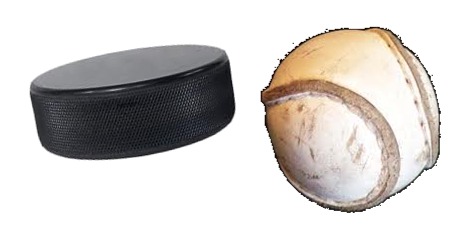|
|
What the Puck..?
31.05.12
by Linda McGrory
DAVID Cameron might only be getting to know his
Irish counterparts but the British Prime Minister
might be interested to know that the word 'Tory'
actually derives from Gaelic.
The Oxford English Dictionary (OED) has recently
been researching the origins of some common words
that have their origins in Irish.
Lexicographer, Susie Dent, recently devoted her
'Origins of Words' section of the popular Channel 4
programme 'Countdown' to the research.
The Dictionary Corner resident word expert, told
presenter, Nick Hewer, whose mother
hailed from the North, that 'puck' in ice hockey
owes its origins to the Irish 'poc' meaning a stroke
or shot at the ball (sliotar) in hurling.
The research also shows that 'puck', as used in ice
hockey, first appeared in a Boston newspaper in 1886
while Ireland did not field a national ice hockey
side until 2004. |
 |
|
An ice hockey puck which owes its
origins to the hurling sliotar. |
According to OED
lexicographer, Katherine Connor Martin, the oldest
borrowing from Irish into English is 'mind'. This is
from the Irish 'mionn', "an obsolete term for a type
of ornament attested in Old English".
Meanwhile, most recent imports from Irish to English
are 'craic', 'punt' and 'fleadh'.
"There was a steady trickle of Irish loanwords into
English from the 15th through 18th centuries, but
this increased to a flood during the 1800s. Oddly
enough, this apex of Irish imports in English
coincided with a period of steep and decisive
decline for the Irish language itself," blogs Ms
Connor Martin.
"The 19th century was also a period of mass
emigration, during which Irish immigrants streamed
to the rest of the United Kingdom and to North
America, taking their distinctive vocabularies with
them. After a millennium of linguistic coexistence,
Irish origins lurk in some unexpected corners of the
English lexicon, where the connection to Ireland
itself has been obscured."
People might be surprised to learn that 'trousers' -
or English 'trowse' - has its origins in the Irish
and Scots Gaelic word 'triubhas'.
The OED records a wit in the 1600s as saying: “A
jellous wife was like an Irish trouze, alwayes close
to a mans tayle".
Other words derived from the Irish include 'slob'
which appears to derive from the Irish 'slab' as
well as 'galore' which comes from the Irish phrase
'go leor', and means “to sufficiency, enough”.
According to the OED 'galore' as it is used in
English "has taken on a more effusive meaning,
implying not merely sufficiency but abundance".
The recent research also examines the word 'puss' as
it is used for face or mouth - not as a synonym for
cat. 'Puss' comes from the Irish 'pus', but is first
attested in English from the US. There it had become
a slang term before developing more widely into the
compounds sourpuss and glamour puss.
Meanwhile, Mr Cameron and his party might be
surprised to learn that their Tory nickname derives
from a band of Irish outlaws or 'tóraidhe' from the
mid 17th century.
Ms Connor Martin writes: "Soon the word was being
used of outlaws as far afield as Scotland and even
India. Then, during the Exclusion Crisis of 1679-81,
those who wished to disinherit the Catholic heir
presumptive to the British throne (known as
Exclusionists or Whigs) used Tory as a disparaging
nickname for their opponents.
"When that Anti-Exclusionist faction eventually
coalesced into a political party, it kept the Tory
name. The present-day Conservative Party in the UK
is a descendant of that original party, though it no
longer wholeheartedly embraces the Tory nickname."
*Linda is a self-confessed 'Countdown' addict. |
|

